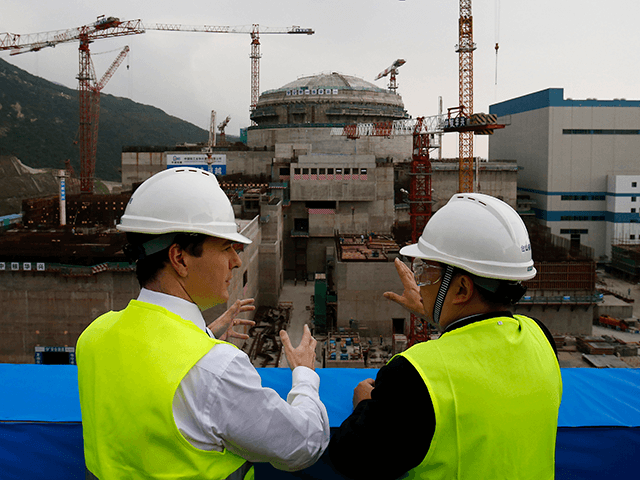Chinese officials and state media continued insisting Tuesday that everything is “normal” at the Taishan nuclear reactor in Guangdong province, dismissing all reports to the contrary as anti-China hysteria.
The French company that helped build the reactor is thoroughly examining the buildup of inert gases in its cooling system and some outside experts are troubled by the data released so far.
China’s state-run Global Times chided American left-wing broadcaster CNN for sensationalizing the problem at the reactor by publishing a letter sent by French company Framatome to the U.S. Department of Energy last week. The Chinese paper insisted the Taishan plant is running smoothly and dismissed French concerns about reduced safety standards by insisting China has better standards than American or European nuclear plants:
On Monday, Framatome told AFP that “the plant is currently operating within the safety parameters,” based on the data available. It said it is “supporting resolution of a performance issue” at the plant.
Lin Boqiang, director of the China Center for Energy Economics Research at Xiamen University, told the Global Times that China’s third generation nuclear reactors, represented by the Taishan nuclear power plant and the Hualong One technology, have higher safety standards compared with second generation reactors like most currently in use in Europe and the US.
He also said that with the Chinese government’s focus on nuclear development, it would be “fatal” for any developers that don’t carefully implement the country’s nuclear safety standards.
Reuters, on the other hand, reported on Tuesday that “minor safety issues have been quite frequent at Taishan,” including two recent incidents:
In March, inspectors checking a faulty voltmeter in Unit 1 accidentally caused an electrical malfunction that triggered an automatic shutdown, according to CNSA incident records.
In April, a burst of radioactive gas unexpectedly entered a pipe at Unit 1’s waste gas treatment system just as workers were trying to seal it, also triggering an alarm, CNSA said.
Another Reuters report quoted a Japanese expert who found the news from Taishan potentially concerning, particularly if a problem potentially brewing inside the No.1 reactor causes a sizable amount of the radioactive inert gases to be vented into the surrounding environment:
“Under normal operating conditions it is true some gases like krypton and xenon will escape and be detected but in this case the concentrations are much higher, so something is happening,” said Tatsujiro Suzuki, a former vice-chairman of the Japan Atomic Energy Commission.
“Once radioactive gas is leaking to the environment it is a serious issue. It could get worse. I think there could be problems with the fuel. It is unusual.”
Other observers believe the gas issue might be caused by deteriorating fuel rods, a problem that afflicts one or two percent of the fuel rods in use worldwide and is usually handled by routine safety procedures.
Framatome’s parent company EDF said on Monday that the buildup of inert gases in the cooling system of Taishan’s No. 1 reactor is a “known phenomenon, studied and provided for in the reactor operating procedures.”
The company suggested it could be caused by a minor issue with the nuclear fuel rods or their seals and said it was not clear if the reactor would need to be shut down in order to address the problem.
This is probably the major point of contention between the French and Chinese partners in the enterprise, as power supplied by Taishan is crucial to the massive industrial hubs that surround it, and power from regional hydroelectric dams is running below normal. The No. 2 reactor on site was only recently brought back online after an overhaul.
EDF and Framatome could be concerned that China’s state-owned CGN power company, which owns 70 percent of the plant, is unwilling to shut the reactor down, and Chinese officials could suppress any information that indicated a shutdown was the safest course of action.
Framatome suggested as much in its letter to the U.S. Department of Energy (DOE) last week, warning that Chinese officials were unilaterally raising the limit of radiological contamination that could be considered acceptable in the area around the plant. Framatome’s letter also highlighted the risk that U.S. export controls could interfere with the French company using certain technology to resolve the issue.
The Chinese government would be extremely reluctant to ask for American assistance, request a temporary waiver from U.S. sanctions, or do anything else that implies China cannot handle the problem entirely on its own.
As of Tuesday morning, French and U.S. nuclear watchdog agencies have not commented on the situation at Taishan. The government of Hong Kong, which is about 85 miles from the Taishan power plant, said on Tuesday it has not detected abnormal radiation levels.
“With regards to foreign media reports about a nuclear plant in Taishan, Guangzhou, the Hong Kong government attaches a high degree of importance to this,” said Hong Kong chief executive Carrie Lam.

COMMENTS
Please let us know if you're having issues with commenting.